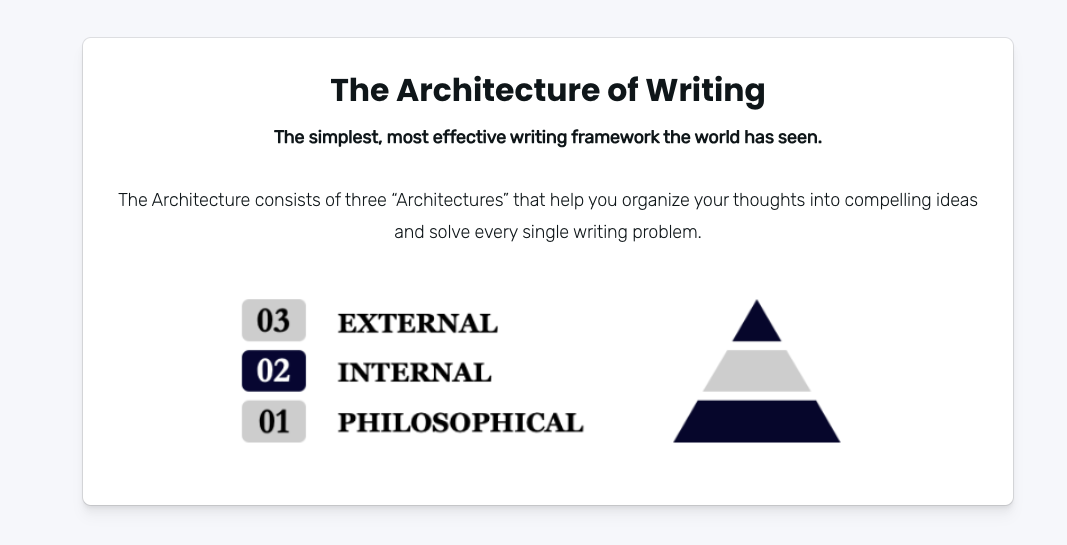7 Best Ways to Beat Writer's Block
Have you ever sat in front of a blank page, feeling stuck and unable to find the right words to write?
Whether you're a journalist, a novelist, a blogger, or a casual writer, it can happen to you. It’s a natural part of the writing process.
It happens to the best of us—including bestselling authors.
Writer's block is like a stubborn wall that gets taller the more we look at it.
We know we need to write, so we sit, stare at our screens, and try to force out words. But often, nothing comes out.
We've all been there, staring at a blank screen, trying hard to put our thoughts into words.
That's why knowing how to overcome writer's block is so important.
But first, what exactly is writer’s block?
Table of Contents
- What is Writer's Block?
- Where Does Writer's Block Come From?
- Why is Writer's Block a Problem?
- How to Overcome Writer’s Block: 7 Ways
- Overcome Writer's Block with Trivium Writing
What is Writer’s Block?
Writer's block is a common challenge where writers find themselves unable to produce new work or experience a creative slowdown.
The condition varies in intensity and duration among individuals. Sometimes it’s just a momentary lapse, but it can also persist.
Understanding and overcoming writer's block is vital for you to stay engaged in the writing process, whether you are a professional writer or not.
If you want to explore deeper insights about the writing process, check out more of our articles on the Trivium Writing Blog.
Where Does Writer’s Block Come From?
The best way to understand something is to know where it comes from.
Writer's block typically stems from a combination of psychological, emotional, and circumstantial factors.

Here are some common sources:
-
Perfectionism: The desire to produce perfect work right from the start can be paralyzing. This pressure to excel can stifle creativity.
-
Fear of Criticism: Worrying about how readers, editors, or peers will judge your work can cause anxiety and self-doubt, which leads to writer's block.
-
Mental Fatigue: Creative work is mentally demanding. Exhaustion, whether due to writing or other life stresses, can sap the mental energy needed for writing.
-
Lack of Inspiration or Ideas: Sometimes, a writer might simply run out of ideas or lose the spark that drives the creative process.
-
Personal Issues: Emotional distress, such as depression, anxiety, or life changes, can significantly impact a writer's ability to focus and create.
-
External Pressures: Deadlines, financial pressures, or high expectations can create stress that interferes with the writing process.
-
Creative Burnout: Continuously engaging in creative work without adequate breaks can lead to burnout, where everything seems uninteresting and uninspiring.
-
Routine Disruption: Changes in a writer's routine or environment can disrupt their creative rhythm.
-
Comparing with Others: Constantly comparing one's work to that of other writers can lead to feelings of inadequacy and block creativity.
-
Overworking: Diving into a project with no breaks can lead to a stale perspective and a lack of fresh ideas.
Understanding the root cause of writer's block is crucial for overcoming it.
By identifying the specific factors contributing to their block, you can take targeted steps to address these issues and reignite their creative process.
Why is Writer’s Block a Problem?
Almost all writers struggle with writer’s block at one point or another.
In fact, writer’s block is so prevalent that some people consider it inevitable. As we’ll explore later, writer’s block is not inevitable.
And it’s important to do whatever it takes to avoid it.
Writer's block has an extremely detrimental impact on productivity and well-being. It can lead to missed deadlines, loss of income, and career setbacks.
What’s more, the frustration of being unable to produce work can heighten stress and anxiety while decreasing confidence and well-being.
This isn’t all.
Writer’s block also leads to a loss of enjoyment in writing, a source of joy and fulfillment for many, and hinders the continuous development and honing of writing skills.
In collaborative writing projects, it can delay the entire project, impacting all team members.
At its core, writer's block is a barrier to self-expression, which is a vital aspect of writing for many individuals.
Addressing writer's block is crucial for maintaining a healthy, productive, and fulfilling writing practice.
How to Overcome Writer’s Block: 7 Ways
1. Understand Your Audience
Effective writing hinges on knowing your readers—who they are and what they need.
Knowing your audience inside and out is incredibly helpful in overcoming writer's block.
When you're clear about who you're writing for, you have a specific direction and purpose.
Who exactly do you want to read your work?
The Architecture of Writing provides you with a framework to understand your audience. There are three “architectures” necessary to write anything.
-
The Philosophical Architecture, which consists of your audience’s values and beliefs.
The philosophical architecture helps you map out what your audience believes. -
The Internal Architecture, which consists of your message and includes your audience.
Your audience is a group of people bound by an interest, a problem, or characteristics. -
The External Architecture, which consists of your voice, tone, and style.
The way you write must reflect your audience’s level of education and reading preferences.
The better you understand your audience, their beliefs, and their needs, the more likely you are to connect with them.
In business, for example, this connection can turn them into loyal customers.
When you write, your main goal is to address your readers' needs.
Maybe they're looking for information or solutions. Maybe they're looking for inspiration. Your writing should guide them.
2. Set Clear Goals and Objectives
When you travel, you know where you’re going and why.
You need the same kind of clarity in your writing. Yet most writers don’t have a clear and defined objective when they write. That’s one of the main reasons they experience writer’s block.
In The Architecture of Writing, two components of the Internal Architecture address this problem. They’re called "Goal" and "Purpose."
-
Goal: Whenever you write, you’re trying to achieve either of these 4 goals—description, explanation, narration, and persuasion.
Before you start writing, decide whether you’re trying to describe something, explain a phenomenon, tell a story, or make an argument. -
Purpose: "Why are you writing this piece?" If you ask this question 3 to 5 times, you’ll land on your purpose.
The purpose is generally an end in and of itself (something undeniably good), such as raising the world’s consciousness.
The reality is, most pieces of writing have an underlying goal and purpose. Very often, though, their writers didn’t get clear on them prior to sitting down to write.
When you’re clear and intentional about your goal and purpose:
-
You avoid writer’s block.
-
You write more quickly.
-
Your writing is better.
Your goal and purpose are just two pieces in the writing process, but they are foundational. Without them, you risk struggling with writer’s block or producing something subpar.
3. Research and Gather Information
This should go without saying, but many writers forget this phase.
Any effective writing process begins with research and information gathering.
Today, you can use the Internet, various databases, and even artificial intelligence tools to help you with research.
As an experienced writing coach and consultant, I’ve seen time and time again that lack of research causes writer’s block. I’ve experienced it for myself, too.
When I research, I collect as much information as possible, the same way a chef collects ingredients before cooking.
Imagine if the chef had to go back and forth between the kitchen and the grocery store... Nonsense!
Research clears the fog of writer's block, letting your ideas flow freely, because you stand on solid ground.

But how exactly do you gather information effectively? It's not just about looking things up; it's about being smart in how you do it. Here are a few tips:
-
Start with a Plan: Before diving in, know what you're looking for.
If needed, create categories of information that help you stay organized. -
Use Reliable Sources: This is critical. Look for information in trusted places like well-known books, respected websites, and industry experts.
Keep in mind that your judge is the ultimate judge for which sources are reliable. Go for sources your audience trusts. -
Take Organized Notes: As you find useful information, write it down. Keep your notes organized so you can easily find what you need later.
It's like keeping your tools tidy so you can find them when you need them. Consider using the DIKW Pyramid. -
Ask Questions: If something isn't clear, don't be afraid to ask.
Sometimes talking to a peer or an expert can give you a fresh perspective. -
Stay Open to New Ideas: Sometimes, you'll find information that changes your thinking, which is great!
It's part of understanding your topic better.
These foundational steps in the research phase not only help you beat writer's block but also make your writing more informative and engaging.
You're not just filling a page; you're sharing valuable knowledge with your readers.
4. Create an Outline
When you're stuck with writer's block, an outline can be a real lifesaver. I think of it like drawing a map before going on a trip.
It shows you the way and keeps you from getting lost!
With an outline, you break down your writing into smaller parts. This makes it feel less overwhelming.
It's easier to tackle a few small pieces than a big, scary task all at once.
Plus, an outline helps you stay on topic. You know exactly what to write about in each section, so you don't wander off track.
Creating an effective outline isn't hard. Here's how I do it:
-
Start with the Main Idea: It tells you and your readers what your writing is about. Write down the main point or goal of your piece.
-
Add Main Points: Each point should support your main idea. Think about the key things you want your readers to know.
-
Include Details for Each Point: Under each main point, jot down a few details or ideas you want to include.
-
Keep It Flexible: An outline isn’t set in stone. If you find new ideas or need to change things as you go, that's okay!
Remember, an outline is there to help you, not restrict you.
It's a tool that gives your writing direction and purpose.
By using an outline, you'll find that your thoughts become clearer, and writer's block becomes a thing of the past.
Pro Tip: Break the task into smaller pieces. Breaking a large writing project into smaller, manageable parts can make it less daunting.
5. Write Freely, Edit Later
5.1. Write Freely
One of the best ways to beat writer’s block is to just start writing without worrying about making it perfect. This means you separate writing from editing.
When you do this, your ideas flow more easily, and you don't get stuck on every sentence.
Imagine you're telling a story to a friend...
You wouldn't stop in the middle to correct every little detail, right? That's the same idea with writing freely first. Just let your thoughts and ideas flow onto the page.
When you write this way, it's like giving your brain permission to be creative. You're not judging or criticizing your ideas.
This approach helps you get past that feeling of being stuck, which is a large part of overcoming writer’s block. You'll be surprised at the interesting ideas that come out when you're just letting yourself write.
5.2. Edit
Once you've got your thoughts down, you can use writing apps like Grammarly or ProWritingAid.
These tools are like having a friendly editor sitting next to you. They'll point out spelling mistakes, and grammatical errors, and even suggest better ways to phrase things.
This Grammarly Review, for example, details how this app makes your writing clearer and more effective.
Ultimately, writing freely and editing later saves you time.
Instead of trying to write and edit at the same time, you're doing one thing at a time. First, you get all your ideas out. Then, you polish them.
It's a more efficient way to work, and it does wonders for your productivity!
So, remember, just start writing. Don't worry about making it perfect. Let your ideas flow, and then use tools like Grammarly to help clean up your work afterward.
This approach makes writing more enjoyable and less stressful. And it’s a great way to beat writer’s block.
Pro Tip: Start with a first draft. Don't aim for perfection in the first go. Start writing anything related to your topic and refine it later.
6. Seek Feedback and Collaboration
When you're stuck with writer's block, talking to colleagues or mentors can also be a big help, They can offer new ideas or different ways of looking at things.
Very often, I find that explaining my work to someone else helps me see it in a new light.
It's amazing how a fresh pair of eyes can spot things you've missed!
Plus, getting feedback makes you feel supported. It's comforting to know you're not alone in this and that others are there to help.
Collaboration is another great way to beat writer's block.
When you work with others, you blend your ideas with theirs. This can lead to exciting and creative results. I’m not simply talking about getting help with what you're writing.
I'm talking about building on each other's thoughts and coming up with something even better than you could have alone.
It's less pressure on you because you're working as a team.

And often, just talking through your ideas with someone else can spark new thoughts and get those words flowing again.
Pro Tip: Learn to talk about your work. Make sure you communicate your work in a clear, compelling way so people can give you helpful feedback.
7. Practice Regularly
Practicing writing regularly is a bit like exercising.
Just as you exercise to keep your body fit, regular writing keeps your writing skills sharp. When you write often, it becomes a normal part of your routine, just like brushing your teeth.
This means you're less likely to face writer's block because writing feels more natural and less like a big challenge.
Honestly, every time you write, it's a chance to learn and grow.
The more you practice, the better you get, and this is true for writing too. With each piece you write, you learn a little more about how to express your ideas clearly and effectively.
It's like building muscle. The more you use it, the stronger it gets.
Regular practice also makes you more confident. You start to see that you can handle all sorts of writing tasks, and writer's block becomes less scary.

The goal isn’t to write a lot, though. It's to reflect on your writing and seeing where you can improve, and try out new things.
Each time you write, you're not only practicing; you're also learning.
That's the beauty of regular writing.
Pro tip: Create a writing schedule. Regular writing hours can instill discipline and a sense of routine, helping to keep the creative juices flowing. Use writing exercises, too. Engage in activities that stimulate your mind and creativity, like free writing or brainstorming.
Overcoming Writer’s Block With Trivium Writing
Overcoming writer's block is about getting organized and keeping things simple.
With these seven ways, you should be able to beat writer’s block. However, if you still struggle after implementing these strategies, Trivium Writing can help you.
Here are a few ways we can help:
- The Architecture of Writing is a method designed for both professional writers and beginners so they can start or continue writing with clarity, confidence, and competence.
- Writing Coaching is part of Trivium Writing’s suite of services and consists of online meetings with a writing coach, who asks you questions and provides you guidance towards your goals.
- Writing Consulting is another Trivium Writing service and is more hands-on than writing coaching. Writing consulting gives you access to a professional writer who gives you ideas and can provide step-by-step instructions to complete your work.
If you don’t know what you need, let’s talk.
Article by Leandre Larouche
Leandre Larouche is a writer, coach, and the founder of Trivium Writing.

-1.png)


.png?width=352&name=SERVICES%20IMAGES%20(33).png)
.png?width=352&name=SERVICES%20IMAGES%20(38).png)
.png?width=352&name=SERVICES%20IMAGES%20(35).png)